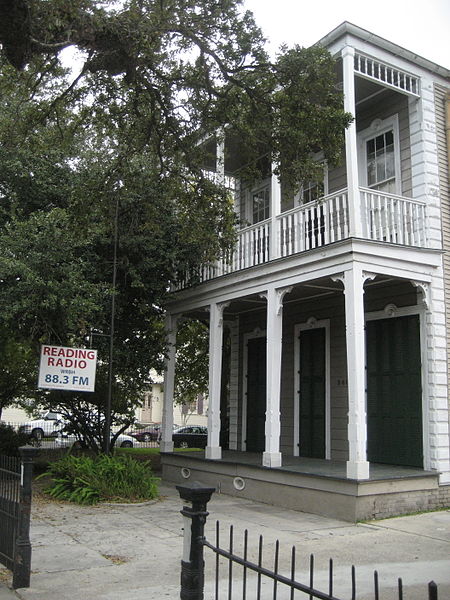
WRBH (Photo credit: Wiki commons, Infrogmation)
In his article titled “A Blessed Boon”: Radio, Disability, Governmentality, and the Discourse of the “Shut-In,” 1920-1930, Bill Kirkpatrick writes that when it was invented, radio was “a heaven-sent device capable of taking individuals who had been bed-ridden for decades — with all the social isolation that implied — and transporting them to the symphony, the Army-Navy game, or even Dayton, Tennessee. Hundreds of letters to newspapers and stations attest to the joy many ‘shut-ins’ found in listening to the radio.”
Although we don’t exactly use the phrase “shut-ins” all that much anymore, we know that Kirkpatrick is referencing anyone who is socially isolated from the world outside of their home, due to physical or mental challenges.
Now that more and more people are staying indoors (do we dare share the stats on the average Netflix binge that occurs over weekends–trust us, it’s a lot), the need to bring the outside world inside continues to be a demand. Enter W 88.3 FM. Although, WRBH 88.3 FM, has a specific aim when it comes to their content. They are a radio station for the blind, and they have been providing that service for decades.
Yes, a blind person could listen to any given radio station and would easily be able to hear it, but WRBH caters specifically to the blind. Having retained the goals of Dr. Robert Maclean, who founded WRBH (a blind mathematician) in 1975, WRBH aims to provide essential (as well as entertaining, hence the reading of The Onion and other such prints) information to those who might otherwise not be able to get it through other sources like television, a print newspaper, or word of mouth.
WRBH bustles with over a hundred volunteers that sign up for time slots to read best selling novels, poetry, local news, and more. With 5 studios and with being open 7 days a week, the Magazine Street location is constantly abuzz.
Being altruistic in spirit and environment, however, does not mean that this non-profit does not face many challenges. When talking with Executive Director of WRBH, Natalia Gonzalez, and the assistant program director, David Benedetto, they both reiterated that most challenges revolve around money and funding. Even with somewhere around 150 committed volunteers, it is often a struggle to find funding to keep their operation running.
Natalia Gonzalez stated that in today’s political climate in which public radio is taking financial losses, WRBH is grateful for the current support and always looking for other avenues of financial support. From tennis and golf tournaments to helping out with Hog for the Cause, WRBH engages with the community in order to give back to all communities.
 NOLAbeings Multimedia artist Claire Bangser created NOLAbeings as a portrait-based story project that marries...
NOLAbeings Multimedia artist Claire Bangser created NOLAbeings as a portrait-based story project that marries...  Voodoo in New Orleans: Reviving history: New Orleans fortune telling This article takes a deep dive into the history of Voodoo in New Orleans, its hybridization with Catholicism, and its present-day place in the city's culture. The author visits fortune-tellers in the French Quarter, using their guidance as a tool for introspection rather than a deterministic predictor of the future. Through her experiences in New Orleans, the author feels a mystical connection to both the past and the future.
Voodoo in New Orleans: Reviving history: New Orleans fortune telling This article takes a deep dive into the history of Voodoo in New Orleans, its hybridization with Catholicism, and its present-day place in the city's culture. The author visits fortune-tellers in the French Quarter, using their guidance as a tool for introspection rather than a deterministic predictor of the future. Through her experiences in New Orleans, the author feels a mystical connection to both the past and the future. 